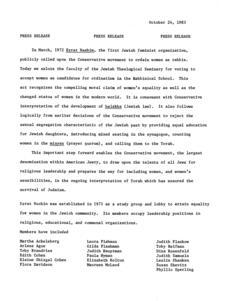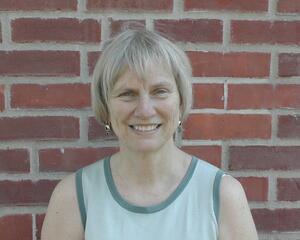Paula Hyman
A small Jewish feminist group, which we called Ezrat Nashim, presented the “Call for Change” to the Rabbinical Assembly of the Conservative movement on March 14, 1972 and disseminated it to the press. The rabbis received it in their convention packets, but we managed to arrange a face-to-face session with the rabbis’ wives. Ezrat Nashim grew out of a study group on the status of women in Judaism that formed in the fall of 1971 in the New York Havurah, a countercultural community of young Jews who studied, observed Judaism, and engaged in politics together. (Not all members of Ezrat Nashim, however, belonged to the Havurah.) We were all well-educated, in both Jewish and secular terms, and had been deeply affected by the nascent American feminist movement in which we participated. Within several months we determined that if any Jewish issue required political action, it was this one, the status of women. At the time we were ten women, the oldest of whom was 27. We chose to target the Conservative movement because most of us had grown up in its ranks, and because the Reform movement was already moving on the issue while Orthodoxy presented too many obstacles.
The “Call for Change” represents a liberal feminist stance, arguing for equal access to positions of leadership and religious participation from which Jewish women were excluded because of their gender. We recognized that the subordinate status of women was linked to their exemption from positive time-bound mitzvot (commandments), and we therefore accepted increased obligation as the corollary of equality. We were not yet able to articulate the ways in which women might seek to transform the Judaism that had marginalized us.
Ezrat Nashim responded publicly, through a press release on October 24, 1983, to the decision of the Jewish Theological Seminary (JTS), the central educational institution of the Conservative movement, to accept women into the Rabbinical School. Two members of Ezrat Nashim, Judith Hauptman and myself, participated in the vote as members of the JTS faculty. For Ezrat Nashim, the vote marked the culmination of achievement of almost all that we had lobbied for over the course of more than a decade. (It should be noted that women still do not have the right to initiate divorce within Judaism, the source of the problem of the agunah, the chained wife who cannot remarry.) It seemed like a prolonged struggle, but I remember pointing out to my “sisters” that in the context of Jewish history 11 years was like the blink of an eye. The evening of the vote, we had dinner together to celebrate.
Paula E. Hyman, a founding member of Ezrat Nashim, was the Lucy Moses Professor of Modern Jewish History at Yale University and president of the American Academy of Jewish Research. She also served as the first female dean of the Seminary College of Jewish Studies at the Jewish Theological Seminary. In addition to several books on French Jewry, she wrote widely on Jewish women’s history. Among her books are The Jewish Woman in America; Gender and Assimilation in Modern Jewish History; the two-volume encyclopedia Jewish Women in America, which she co-edited with Deborah Dash Moore; and Jewish Women: A Comprehensive Historical Encyclopedia, a DVD, now online, with Dalia Ofer. She also edited and introduced Puah Rakovsky’s My Life as a Radical Jewish Woman: Memoirs of a Zionist Feminist in Poland. She passed away on December 15, 2011.






